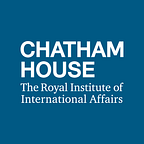The Week at Chatham House: US Strikes Syria, Robots to the Rescue in Japan and Germany’s Take on Brexit
The latest international news and analysis this week.
US Strikes Over Chemical Weapons Attack in Syria
The US has launched missile strikes on an air base in Syria following a suspected chemical weapons attack by the Bashar al-Assad government on a rebel-held town in northern Syria.
Beyza Unal spoke to ITV News this week to explain the complexities of producing a nerve agent on the scale witnessed in Syria while Lesley Vinjamuri questioned whether Trump has any leverage over Russia’s Syria policy on BBC Newsnight.
Plus, James Nixey and Jacob Parakilas sat down to discuss what we can expect to happen next in Washington, Damascus and Moscow.
Trump and Jinping Hold First Summit
Donald Trump is set to meet Chinese President, Xi Jinping, for the first time today with discussions on trade, North Korea and the South China Sea likely to crop up.
Kerry Brown discusses why the topic of North Korea in particular will be a thorny issue: location, location, location — the country’s position right next door to China makes it a pivotal, and potentially combustible, issue between the two nations.
Germany’s Take on Brexit
Following the start of the two-year countdown for Britain’s exit from the EU, assumptions that Germany will take a prominent role in the forthcoming Brexit talks are flawed, explains Katinka Barysch.
For Germany, Brexit is only a small part of Angela Merkel’s 2017 agenda: from the ongoing refugee crisis to the conflict in Ukraine, the German chancellor will be more concerned with dealing with a cocktail of other foreign policy challenges while also fighting a difficult election in September in which domestic issues, such as immigration, will likely form the main debate.
Libya’s Power Vacuum Spells More Turmoil
One year ago, Fayez al-Serraj, prime minister of the internationally recognized government in Libya, entered Tripoli to defy threats from local militias and proclaim a new order for the country beset by turmoil. Tim Eaton explores why, one year on, the government still wields little power and why, with declining international engagement and rising conflict between local armed groups across the country, an escalation of violence is likely.
Chatham House Prize 2017 Nominees Announced
Chatham House is pleased to announce the nominees for the Chatham House Prize 2017: Charlotte Osei, Juan Manuel Santos and Jens Stoltenberg.
Previous winners have included John Kerry and Mohammad Javad Zarif, Médecins Sans Frontières, Melinda Gates and Aung San Suu Kyi.
Robots and Pensioners to the Rescue in Japan
There could be a silver lining to Japan’s aging population writes Joji Sakurai in the latest issue of The World Today. The proportion of Japanese people above 65 is expected to jump from roughly 25 per cent to nearly 40 per cent by 2050, and Sakurai takes a look at how Japanese society has been adapting to these changing demographics, with both robots — as well as pensioners — replacing the dwindling youth in the country.
